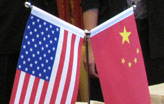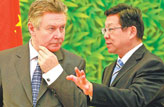Top Stories
Beijing buys more US bonds in May
Updated: 2011-07-19 11:02
By Zhang Yuwei (China Daily)
As a big investor, China 'has few choices' other than Treasuries
NEW YORK - Despite the impasse in the ongoing debt ceiling talks, China, the largest foreign holder of US Treasuries, increased its holdings for the second straight month in May, according to the Treasury International Capital (TIC) report released on Monday.
China increased its holdings by $7.3 billion to $1.16 trillion, said the Treasury Department.
The total foreign holdings of Treasury securities rose 0.6 percent to $4.5 trillion in May, the same month the US reached its $14.3 trillion borrowing limit the total amount that the US government can legally borrow to finance its operations.
Since reaching the limit on May 16, the Treasury has relied on accounting maneuvers to prevent a federal default. US Treasury Secretary Timothy Geithner said that if the debt ceiling was not raised by the Aug 2 deadline, the government would default on its obligations to its foreign bondholders.
The May TIC data shows that foreign investors will still keep investing in US government debt, with Japan and the United Kingdom, the second and third largest holders of US Treasuries, also increasing their holdings.
As the largest foreign creditor holding more than $1 trillion in Treasury bonds, in the short term, there is "very little China can do to mitigate potential risk relating to US Treasuries", said Yao Wei, China economist with Societe Generale in Hong Kong.
"It is a very awkward situation right now for China. The turmoil is as much a wake-up call to the US as to China," Yao said.
"Investors like China should seriously rethink the assumption of US Treasuries as a safe-heaven," she said.
China cannot afford further delays in all the structural reforms to rebalance its economy to reduce external surpluses, internationalize the yuan, open capital accounts and diversify foreign exchange reserves, Yao added.
For a super-sized investor like China, despite other options such as euro debt, gold, and emerging market assets, China simply does not have many choices, Yao said.
"Diversification can only happen marginally. The key issue here is not what China should buy but how China can slow down the pace of forex reserve accumulation to reduce the need to buy," Yao noted.
David Backus, an economics professor with the Stern Business School at New York University, still believes US government debt is "a low-risk option".
"The Chinese should do what's best for them, on this and other things. The one rule any investor should follow is diversification: they should not buy all US, UK, Japanese, German, or any other issuer. That said, they could do a lot worse in credit risk terms than buying US government debt," said Backus.
Some, however, have doubt over the Treasury data. The data, even with the increase, may "underestimate what China is buying", said Scott Sherman, an interest-rate strategist at Credit Suisse Group in New York.
"China deals through foreign intermediaries" leading to initial tallies counting their purchases as belongings to other holders, such as the UK, Sherman told Bloomberg News.
Sherman, like many US experts, believes a default on US Treasury debt is a "very unlikely event."
"Unlike some other countries in the news, there is not a question about the ability of the US to meet its debt," he said.
The point is echoed by Chris Ahrens, head interest-rate strategist at UBS in Stamford, Conn.
"The Treasury market is the largest and most liquid market in the world. There is no other market where large investment grade risk positions can be transferred on such a narrow offer. It will remain so for the foreseeable future," Ahrens explained.
The political standoff between US President Barack Obama and Republicans in Congress has been going on for weeks. It's two weeks to the Aug 2 deadline. If Congress doesn't increase the limit, borrowed funds wouldn't be available to pay bills and the US may default on its debt obligations.
In Washington DC, Republicans have demanded large spending cuts as a condition for voting in favor of raising the limit while Obama has pushed to include some tax increases, adamantly opposed by Republicans.
Last week, global ratings agencies, including Moody's and S&P, have put the US triple-A credit rating on review for a possible downgrade.
Dagong, a Beijing-based ratings agency, said it would consider knocking the credit rating of the US down another peg. Dagong downgraded it from AA to A+ last November after the US government announced a second round of quantitative easing.
"The review will be concluded when one of the two things happens, either there is a default, which is less probable, or raising the debt limit, so we will be sure at that point there won't be a default," said Steven Hess, senior credit officer at Moody's Investors Service in New York.
Hess added that this review is more of a "unique situation". The last time Moody's put certain US Treasury bonds (that had interest rates coming due) on review was in 1996. But this time the agency has put all US government bonds on review for downgrade, which, Hess said, has never happened before.
Since the deficit negotiation is occurring as part of the process, "we will wait and assess how significant and credible the deficit reduction measures are," Hess said.
"If it is just a temporary increasing of the limit and the negotiation is continuing and there isn't a credible plan for deficit reduction", Hess said, a "negative outlook" may be put on the rating, indicating it still may be going down within a year or two.
Experts in Beijing expressed their concerns over how this will affect US' largest foreign creditor.
Yu Bin, a Chinese economist with the Development Research Center, a ministry-level think tank, said that "the US economy is a worry".
Chinese Foreign Ministry spokesperson Hong Lei at a separate briefing urged the US to adopt "responsible policy to ensure investors' interests".
China Daily
(China Daily 07/19/2011 page1)

Specials

China-US Governors Forum
The first China-US Governors Forum is held July 15 in the Salt Lake City, the United States.

My China story
Foreign readers are invited to share your China stories.

Rare earths export quota
China kept its export quota at almost the same level as last year.